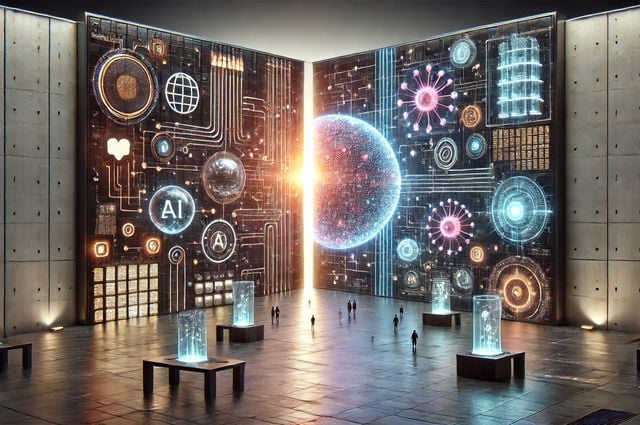Democratizing AI: Proprietary vs. Open Standards
15 experts shared their view
Lots of brands are rolling out their own proprietary AI tools, but there's a growing case for keeping things more open and collaborative. With standards like Anthropic's Model Context Protocol (MCP) starting to emerge, a growing question is should the industry be working together to make AI more accessible. Is building your own AI the new walled garden - or should hospitality embrace open standards like MCP to democratize innovation?
When it comes to where our Distribution landscape is headed - it's not even a question. Of course uniting our efforts is the only way to go. Otherwise we'll lose another OTA battle. But there's much more to the world of AI functionalities, it has its tenticles in every part of our tech ecosystem, not distribution alone. Variations of use cases are almost limitless, it's crazy to see what use cases are being introduced by tech startups.
Brands and vendors will have to adopt MCP for the Distribution use case, they have no choice (it's what public-facing AI platforms will use to connect to external systems). But that doesn't prevent them from building their own solutions that are based on those connections.
Fragmentation is inevitable, unfortunately, because our industry is very diverse. Some fragmentation is good (variety of choices of functionality for hoteliers), some is really bad (lack of seemless integrations that results in data silos).
I think we are in danger of running before we can walk here. MCP is Anthropic’s pitch for an open standard to let "agentic AI" bots built on next-word LLMs share data, for example, an OpenAI bot talking to a Gemini bot.
Unless you are Marriott or Hilton with hundreds of in-house developers, or a big OTA like Expedia or Booking.com, this really isn’t something you need to worry about. Focus instead on practical tools like RPA. UiPath, one of the sector leaders, for instance, has launched a tool called "Maestro" to orchestrate a mix of rules-driven deterministic tasks and stats-driven Gen AI tasks. Microsoft has Power Apps. Salesforce has its own internal tools. Oracle was late to the AI cloud party but is catching up.
The reality is most hotels still struggle to get their PMS to talk reliably to their RMS or M&E system. Don’t get distracted by the “agentic AI” hype. A lot of it is just “agentic wash” - old tools rebranded with a premium price tag. Kick the tyres and look under the hood.
You could establish your own protocols instead of MCP, A2A, or other widely endorsed standards for agentic interactions. But that would be like creating your own version of HTTP. Not a great idea.
The good news is I don't think companies feel the need to change that basic agent-friendly plumbing. There is plenty of room to innovate within those standards to attract buyer-side agents from Perplexity, Google, OpenAI, and others, and to drive business through these potentially supplier-direct channels. I say potentially because right now, only the big distributors like Booking.com have invested in agent-optimized interfaces.
It's not that you need Booking.com's scale to do it either, but it does require:
- A plan that uses standard protocols (e.g., MCP, A2A)
- Structuring your data so it's easily machine-digestible and consistent
- An API built for agents, not OTA updates
Websites are not going anywhere and many people will still browse for research and booking. But agentic channels will run alongside them and grow quickly in the coming months. Suppliers should be aggressively designing and building now, or risk losing the agentic channels to OTAs and other intermediaries the same way they did with web channels.
To me, this is not really a question of technology but a question of power and loss. The players with the most to lose will do everything they can to lock the gates and hold control, no matter how shiny the open standards look on paper. Yes, MCP or something similar may exist, but that does not mean it will be truly open or accessible to everyone.
As a person with vast experience in the deployment of standards, I wholeheartedly support an open approach.
However, the basic challenge is that the hospitality industry is unregulated, which makes achieving global collaboration a monumental task and a "bridge too far".
In my career, I have observed a tendency toward "lowest common denominator" thinking rather than "highest". The OTA Standard being a good example. This approach lowers the bar and is something I find counter productive. Technology is a competitive advantage, and a business should not be held back because others can not or will not keep up.
While a certain level of standardization may be achieved, I do not see it as being universally adopted. Ultimately, multiple paths will likely lead to a similar outcome, and the best solutions will not be confined by a restrictive standard.
Hospitality has spent decades trapped in walled gardens: brands, OTAs, legacy vendors, all hoarding data and calling it "innovation." Now we risk repeating the same mistake with AI.
The truth is, no single hotel company will out-innovate the collective intelligence of an open ecosystem. Standards like MCP point to a future where AI is not another moat, but connective tissue letting hotels, tech partners, and yes, even competitors, build interoperable systems that actually serve the guest.
The choice is stark: either we rebuild the same old walls with shinier bricks, or we embrace openness and give our industry the leapfrog moment it desperately needs. If hospitality wants to stop being disrupted and start leading again, we can not afford another generation of closed tech.
To get there, we must finally confront the abysmal state of hotel tech. For decades, gatekeepers have built systems that served everyone except the guest, locking the industry in soilos and calling it progress. AI is our chance to tear down those walls and build something on open rails that actually grows the pie. The shift to openness is inevitable. The only real question is: who will have the vision (and the guts) to lead the charge?
The smarter path is to embrace open standards like Model Context Protocol (MCP), which provide shared plumbing for AI. With common interfaces, it becomes easier to connect models, tools, and hotel systems without custom fixes, cutting costs and speeding pilots. Openness also strengthens safety and governance.
The industry should keep the basics open—adapters, schemas, evaluation sets—and protect what is unique: guest data, brand voice, and service design.
The bottom line: avoid repeating the walled garden mistakes. Use open standards for the infrastructure, and compete on guest experience where brands truly stand out.
The proprietary vs. open AI debate masks a deeper issue: hospitality needs industry‑wide collaboration. Alliants advocates an open, people‑first approach, not walled gardens. Effective AI must be shaped by those who use it—line staff, GMs, new voices, and diverse developers—not a few executives or dominant vendors. Standards should enable flexibility because every hotel and tech stack operates differently. Above all, empathy matters: technology should enhance human service for guests and staff—or risk losing the guest.
Related article by Tristan Gadsby
Open standards like Anthropic’s Model Context Protocol (MCP) are essential in the consumer industry, especially in hospitality, where seamless customer experiences span loyalty programs, mobile apps, reservations, e-commerce, point-of-sale and service channels. AI delivers the most value when these touchpoints are connected, enabling intelligence to flow effortlessly across platforms. Without open standards, proprietary solutions risk becoming isolated, limiting impact for both operators and customers.
That said, proprietary AI has a critical role to play. Its true value comes when it moves beyond providing access to data and drives differentiated decisions—optimizing pricing, personalizing offers, or orchestrating real-time service. This is where organizations can create a competitive advantage. But to sustain that advantage, those decisioning systems must sit on interoperable foundations. Open standards ensure that proprietary intelligence isn’t locked in a silo but can pull from and contribute to the broader ecosystem.
The key is to focus on helping clients balance both dimensions: leveraging proprietary AI where it adds decision-making value while relying on open standards to guarantee scalability and resilience. The opportunity is not “closed versus open” but designing AI adoption that preserves agility, maximizes value, and advances the consumer industry together.
Custom-built proprietary AI offers larger brands a temporary competitive edge. But this "walled garden" approach is shortsighted, creating integration challenges and gatekeeping tech innovation.
The true power of hospitality AI? lts ability to connect and communicate. That's why hotels must adopt open standards, enabling discovery by AI agents already transforming the guest journey.
As an open standard, Anthropic's Model Context Protocol (MCP) allows AI agents to directly query hotel systems for rates and availability. But it's just the beginning. IBM's Agent Communication Protocol (ACP) enables different AI agents to talk to each other (i.e., a travel platform's AI using ACP to request a quote from a hotel's agent). Furthermore, Agent2Agent (A2A) Protocol facilitates complex, multi-turn conversations, allowing a guest's AI to coordinate with a hotel's concierge AI to book a room and a dinner reservation in one go.
Hospitality should embrace these open standards to accelerate collaborative progress and democratise innovation. While proprietary AI offers a few brands the ability to create unique experiences, open standards are the key to unlocking a better, more accessible path for AI to find and book every property. This ensures that everyone, from independents to large chains, can participate in the AI-driven future.
Hospitality has a long history of fragmented systems and closed architectures, which have made innovation slow. And these weaknesses become even more pronounced with AI, which relies on open systems to fully work. While some brands are racing to build proprietary tools, this approach risks reinforcing the fragmentation in our industry. Open standards like the Model Context Protocol (MCP) represent a much-needed shift in the opposite direction.
MCP is the foundation that enables smoother collaboration between hoteliers, developers, and AI providers. Instead of requiring custom integrations for every tool, MCP gives AI agents one consistent way to understand data and take action across systems, from bookings and payments to housekeeping and CRM. This lowers the barrier to entry for AI, reduces integration costs, and allows our industry to experiment faster.
The future of AI in hospitality shouldn't be locked into a proprietary tool; it should be co-created. Embracing standards like MCP is a critical step in that direction. For example, connecting to an MCP Server allows AI agents to work across systems, ensuring innovation isn"t limited by the boundaries of one vendor"s ecosystem. This is how we move AI agents from theoretical concepts to day-to-day operations.
Proprietary AI tools may offer short-term competitive advantages, but they risk creating walled gardens that stifle collaboration and slow industry-wide progress. In hospitality, where interoperability and guest-centric innovation are key, open standards like Anthropic's Model Context Protocol (MCP) offer a compelling alternative. They enable systems to communicate, share context, and evolve together—making AI more accessible to operators of all sizes especially the independant hotels who cannot invest in expensive tech stacks
Hospitality thrives on shared best practices and service excellence. Embracing open standards democratizes innovation, fosters transparency, and accelerates learning across the sector. Rather than reinventing the wheel, we should be building on common frameworks that allow customization without isolation. The future of AI in hospitality should be collaborative, not siloed.
In hospitality, we've learned that walled gardens look tidy on the whiteboard and costly in the real world. Proprietary AI risks repeating PMS/CRM mistakes—fragmented data, lock‑in, and brittle integrations that fail at the point of need. What actually drives outcomes is interoperability, accountability, and frontline adoption.
Open standards like MCP aren't "nice to have"; they're scaffolding for safe scale. A model‑agnostic context layer lets owners, operators, and brands plug in best‑fit models, enforce governance, and preserve optionality as the landscape evolves. It keeps procurement honest, accelerates innovation cycles, and de‑risks change because teams aren't retrained every time a vendor pivots.
The smart play is hybrid: brand‑specific workflows and IP atop open protocols and portable context. That's how you get measurable ROI—clean handoffs between systems, auditable prompts/outputs, and fewer brittle custom connectors. Crucially, it protects guest and employee experience by reducing failure points during peak operations.
Hospitality is at its best when it's human‑led, tech‑enabled, and vendor‑neutral. Embrace open standards, demand proof of interoperability, and invest in training and governance. That's how we democratise AI—while keeping control, preserving independence, and making change stick.
There is a vast difference between AI tools and LLM's. Tools should be open source so that the maximum number of developers will create innovative applications. This will take the major companies with those tools, Anthropic, Google, Amazon and others, to act like Google did when offering Android free for use.
But large language models must be fenced in and not available outside of the chain or other owner of the data used for training them. The term, small language model (SLM) was created to differentiate these from open LLMs which could expose proprietary data to other LLMs for training and more.
We could experience so much more fast hospitality and travel innovation if more tools were available to developers without cost.
Years ago I wrote that system integration was the biggest taboo in travel, and little has changed since then. We remain a sector that is notoriously inside-out, obsessed with our own architectures, while the real battle is happening outside, in the connective tissue that links us to the wider ecosystem.
For me, surprise, surprise! proprietary is never the answer. What we need is something closer to the Linux ethos, an undercurrent of openness that is less about ownership and more about collective construction.
But accessibility is not the same as democratization. To move forward we need not only technical standards, but also a cultural willingness to abandon silo logics, to renounce the instinct to hoard and to lock. Otherwise MCP risks becoming just another bright label on the same opaque box.
In the end, the real issue is not proprietary versus open, but whether we are building infrastructures designed for rent extraction or infrastructures designed for collective intelligence. And hospitality, which at its core is the art of hosting the other, should understand better than any sector that openness is not a luxury, it is existential.
















